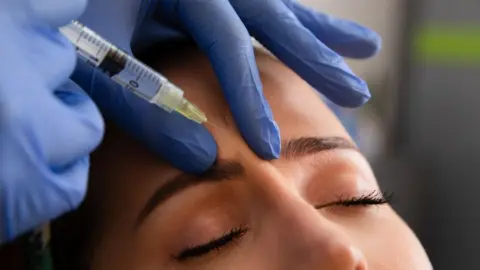In an alarming revelation, officials in the United Kingdom have raised concerns about the growing trend of cosmetic procedures, such as fillers, Botox, and Brazilian butt lifts, being administered in highly inappropriate locations. Portable environments like public toilets and hotel rooms are reportedly becoming venues for these risky beauty practices, highlighting a troubling lack of regulation within the aesthetic industry. This situation poses significant risks to individuals seeking these enhancements, as unlicensed practitioners may not follow necessary safety protocols and standards.
The Chartered Trading Standards Institute (CTSI) has issued strong warnings about the perils associated with unregulated cosmetic procedures. According to their observations, “lives are being put at risk every single day,” emphasizing the dire need for regulatory measures to safeguard consumers. A call for an urgent licensing scheme has been made to ensure that only qualified practitioners perform these procedures.
Compounding these risks is the widespread sale of unsafe fillers and fat-dissolving injections online. The Department for Health and Social Care has acknowledged these warning signs and stated that the government is currently exploring potential new regulations aimed at protecting consumers from substandard cosmetic treatments.
In light of recent findings, Kerry Nicol, external affairs manager at the CTSI, expressed deep concern regarding the potential dangers posed to the public due to the absence of robust regulatory frameworks within the aesthetic industry. The scale of potential harm is nothing short of alarming, underscoring the urgency for immediate action to eliminate subpar practitioners from the market. Nicol advocates for a cross-government effort to address these issues efficiently.
Young people are particularly vulnerable in this scenario. Trading standards officials indicated that verifying the medical qualifications and the practitioner’s age-checking protocols can often be a “postcode lottery.” The lack of compliance with age restrictions raises concerns regarding minors receiving cosmetic injections. Consequently, the CTSI recommends several precautionary measures for prospective clients. They advise thoroughly checking the qualifications of those advertising cosmetic treatments, exercising caution with practitioners who primarily promote their services through social media, and refraining from self-administering beauty products at home.
Compounding the problem are the remarkably low prices at which fillers and related injections are marketed online, with some products priced as low as £20. A worrisome trend has also emerged with fat-loss injections, such as the “Lemon Bottle,” which fly under the radar of regulatory oversight in the UK. Recent reports from the UK Health Security Agency (UKHSA) indicated that several individuals experienced adverse reactions after being injected with counterfeit Botox. The risks associated with procedures like Brazilian butt lifts (BBLs), which involve injecting fillers into the buttocks, are particularly concerning due to potential complications such as blood clots and infection.
Cases of severe complications have sadly been documented. For instance, in September of last year, Alice Webb, a 33-year-old woman, reportedly died after complications during a liquid BBL in Gloucestershire. Such tragedies underscore the urgent need for regulatory reforms and increased awareness surrounding the dangers associated with unregulated cosmetic treatments.
Currently, no licensing is required to perform cosmetic procedures in England; however, this may soon change as parliament considers amendments to the existing Health and Care Act. The government has proposed adjustments that would implement a licensing scheme to better protect consumers from unqualified operators in the cosmetic sector. Officials have voiced the critical need to prioritize patient safety and have urged individuals considering cosmetic procedures to seriously weigh the health implications involved, advocating for consultations with licensed, insured, and appropriately trained practitioners.
In Scotland, plans to regulate aesthetic treatments have been revealed, yet similar regulatory initiatives have not been announced for Northern Ireland and Wales. Organizations like Save Face, which keeps a register of accredited practitioners, have been actively campaigning against the availability of certain procedures, such as liquid BBLs, in mainstream markets. Ashton Collins, the director of Save Face, reiterated the organization’s commitment to enforcing existing laws designed to protect patients from unethical practitioners who exploit regulatory gaps to operate without oversight.
Overall, the urgent call for regulation reflects growing public concern about the safety of aesthetic treatments and the need for accountability within this burgeoning industry.



